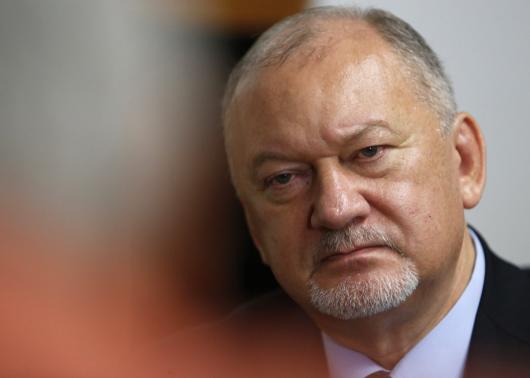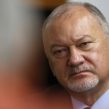
Tremors in the ‘Donetsk People’s Republic’s’ Military and Political Hierarchy (Part One)
Publication: Eurasia Daily Monitor Volume: 11 Issue: 139
By:

On July 28, Russian state television presented Vladimir Antyufeyev as “acting chairman of the council of ministers of the Donetsk People’s Republic [DPR prime minister],” and featured an interview with Antyufeyev from Donetsk (Rossiya 1 TV, July 28).
Earlier on that day, Antyufeyev himself told local media that he was moving up from his “deputy prime minister’s” post to that of “first deputy prime minister” and “acting prime minister,” as well as “acting commander-in-chief” of DPR’s forces (novorossia.su.ru, July 28; OstroV [Donetsk], July 28).
The known incumbents of those posts have been Aleksandr Boroday and Igor Girkin/Strelkov, respectively. Antyufeyev did not clarify which higher authorities had appointed him as their temporary replacement, and how long he would hold the two posts in his hands.
The “prime minister,” Boroday, left Donetsk for Russia, apparently on July 27. Two days earlier Boroday had conveyed a deeply pessimistic assessment of the “DPR’s” situation to a Kremlin handler by telephone. Ukrainian intelligence intercepted that conversation (sbu.gov.ua, July 28; Interfax-Ukraine, July 29).
For his part, Girkin/Strelkov briefed local media on the military situation on July 28 as commander-in-chief. A video-recording of that briefing, aired by the Moscow-based internet TV channel Life News (with which Boroday is closely linked), shows Girkin/Strelkov claiming that his forces killed “four mercenaries of the Negroid race” that day. He implies that these were part of a larger number of “American mercenaries” on the ground (Life News, July 28, dnr.today, Russkaya Vesna, July 28).
While Girkin/Strelkov’s briefing attempted to project confidence, Antyufeyev did acknowledge that Ukrainian government forces were retaking towns and advancing on the city of Donetsk. The Organization for Security and Cooperation in Europe (OSCE) Special Monitoring Mission’s deputy chief, Swiss diplomat Alexander Hug, visited the newly empowered Antyufeyev in Donetsk. The Special Mission seeks help for international inspectors to access the crash site of the Boeing 777 airliner. “DPR” forces or their mentors from Russia shot it down on July 17, killing all 298 aboard (see EDM, July 18, 21, 23, 24, 25). Antyufeyev responded evasively to the OSCE’s request (Interfax, July 28). The OSCE and Antyufeyev have been acquainted with each other for 20 years in Moldova (see below).
Antyufeyev’s Russian TV interview topped the prime-time newscast (Rossiya 1 TV, July 28). Antyufeyev told Russia’s public that “Ukraine’s national fascists have organized a military invasion of the DPR, under the leadership of Kyiv’s rulers and the patronage of Western countries, primarily the USA. They aim to seize this territory, destroy its industry, and use [this] bridgehead for schemes that, in their opinion, would have a destructive effect on the Russian Federation’s statehood.”
That argument raises the stakes substantially in Russia’s war against Ukraine. It is no longer a matter of gathering more “Russian lands,” but rather of defending Russia’s existing territory and statehood itself. Implicitly this builds the case for Russia’s heavier, bolder involvement in support of the embattled Donetsk and Luhansk “people’s republics.”
Lieutenant-General Antyufeyev, the long-serving “state security minister” of Transnistria, became “deputy prime minister for security matters [silovyie voprosy]” in Donetsk on July 10, on arrival from Moscow. He was appointed to supervise the “DPR’s” “state” security agency, internal affairs “ministry,” and courts of justice (see EDM, July 21). The title of “acting defense minister,” first listed on July 28, expands Antyufeyev’s portfolio. This may be viewed as an attempt to encroach on Girkin/Strelkov’s authority, possibly laying the ground for a subsequent challenge to him. The Kremlin seems uncomfortable with Girkin/Strelkov’s hero status in Russia’s nationalist circles.
Girkin/Strelkov had taken over Sloviansk in mid-April, appointed himself commander-in-chief on May 12, and was confirmed as “defense minister” on May 16, pursuant to the “DPR’s” May 11 “referendum” (Novosti Donbassa, May 12, 16). His real command authority remained confined to the Sloviansk stronghold, but he acquired almost mythical authority in Russia’s ultranationalist camp.
Read Part Two here.




